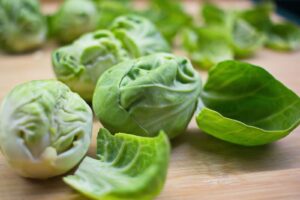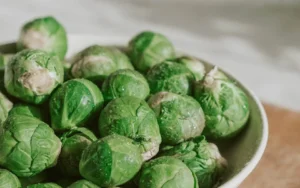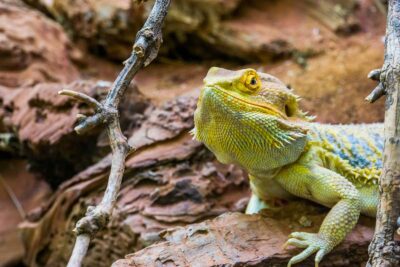Can bearded dragons eat Brussels sprouts? Delving into the realm of bearded dragon care often leads to a myriad of questions regarding their dietary needs and preferences. Among the plethora of foods available, Brussels sprouts emerge as a curious contender.
These miniature cabbages, packed with nutrients, find their way onto many human plates, but can they also become a part of a bearded dragon’s diet? In this exploration, we delve into the nutritional value of Brussels sprouts and whether they align with the dietary requirements of these beloved reptilian companions.
Can bearded dragons eat brussel sprouts?

Bearded dragons can eat Brussels sprouts occasionally as part of a varied diet, but they should not be a staple food. Brussels sprouts are high in oxalates, which can bind to calcium and prevent its absorption, potentially leading to metabolic bone disease in bearded dragons.
It’s best to offer Brussels sprouts as an occasional treat, and they should be fed in moderation and alongside other vegetables that are lower in oxalates and higher in calcium. Additionally, make sure the Brussels sprouts are chopped into small, manageable pieces to prevent choking.
Always monitor your bearded dragon’s response to new foods and consult with a reptile veterinarian for specific dietary recommendations.
How the nutrients in Brussels sprouts can benefit bearded dragons
Brussels sprouts can be a nutritious addition to a bearded dragon’s diet when offered in moderation. These leafy greens are rich in vitamins and minerals that can contribute to your pet’s overall health. Here’s how the nutrients in Brussels sprouts can benefit bearded dragons:
- Vitamins: Brussels sprouts are packed with essential vitamins such as vitamin A, vitamin C, and vitamin K. Vitamin A is crucial for maintaining healthy skin and eyesight, while vitamin C supports the immune system and aids in wound healing. Vitamin K is important for blood clotting and bone health.
- Minerals: Bearded dragons need minerals like calcium and phosphorus for strong bones and overall metabolic function. Brussels sprouts contain these minerals in balanced amounts, which can help prevent metabolic bone disease, a common health issue in captive reptiles.
- Fiber: Brussels sprouts are a good source of dietary fiber, which aids in digestion and helps prevent constipation in bearded dragons. A diet high in fiber can also promote gut health and reduce the risk of digestive problems.
- Water content: While Brussels sprouts aren’t as hydrating as some other vegetables, they still contain a significant amount of water, which can contribute to your bearded dragon’s overall hydration levels.
- Variety: Offering a diverse range of vegetables like Brussels sprouts helps ensure that your bearded dragon receives a wide array of nutrients essential for its health and wellbeing. Rotation of vegetables also prevents dietary monotony and encourages a balanced diet.
However, it’s essential to offer Brussels sprouts in moderation and as part of a varied diet that includes other vegetables, leafy greens, and occasional insects for protein.
Additionally, be sure to chop Brussels sprouts into appropriately sized pieces to prevent choking and always wash them thoroughly to remove any pesticides or contaminants. Lastly, observe your bearded dragon’s response to new foods and adjust its diet accordingly based on its individual preferences and nutritional needs.
Factors to consider before feeding Brussels sprouts to bearded dragons
Before adding Brussels sprouts to your bearded dragon’s diet, there are several important factors to consider to ensure their health and wellbeing:
- Nutritional balance: Brussels sprouts should be just one component of a balanced diet for your bearded dragon. Their diet should primarily consist of leafy greens, vegetables, and occasional insects for protein. Ensure that Brussels sprouts are offered alongside other nutritious foods to provide a well-rounded diet.
- Calcium to phosphorus ratio: Bearded dragons require a calcium to phosphorus ratio of approximately 2:1 in their diet. Brussels sprouts contain some calcium but also have phosphorus, so it’s important to balance their intake with calcium-rich foods like calcium-fortified insects (such as gut-loaded crickets) or calcium supplements.
- Size and preparation: Chop Brussels sprouts into appropriately sized pieces for your bearded dragon to prevent choking hazards. Younger or smaller bearded dragons may need smaller pieces than larger adults. Additionally, ensure that Brussels sprouts are thoroughly washed to remove any pesticides or contaminants before feeding them to your pet.
- Introduction and observation: When introducing Brussels sprouts or any new food item to your bearded dragon’s diet, do so gradually. Start with small amounts and monitor your pet’s response for any signs of digestive upset or adverse reactions. If your bearded dragon shows any negative reactions, discontinue feeding Brussels sprouts and consult with a reptile veterinarian.
- Variety and rotation: While Brussels sprouts can be a nutritious addition to your bearded dragon’s diet, it’s essential to offer a variety of vegetables and leafy greens to ensure they receive a diverse range of nutrients. Rotate the vegetables you offer regularly to prevent dietary monotony and provide a balanced nutritional profile.
- Health considerations: Consider any existing health conditions your bearded dragon may have before introducing Brussels sprouts or any new food. Some reptiles may have specific dietary restrictions or sensitivities, so it’s essential to tailor their diet accordingly under the guidance of a reptile veterinarian.
By considering these factors and incorporating Brussels sprouts into your bearded dragon’s diet responsibly, you can provide them with a nutritious and varied diet that supports their overall health and wellbeing.
Preparing Brussels Sprouts for Bearded Dragons
Preparing Brussels sprouts for your bearded dragon involves several steps to ensure they are safe and suitable for consumption. Here’s how you can prepare Brussels sprouts for your pet:
- Selection: Choose fresh Brussels sprouts that are firm, compact, and free from blemishes or signs of decay. Avoid Brussels sprouts that are wilted, discolored, or have soft spots.
- Washing: Thoroughly wash the Brussels sprouts under running water to remove any dirt, pesticides, or contaminants. You can use a vegetable brush to gently scrub the surface if needed. Rinse them well to ensure they are clean before preparation.
- Chopping: Chop the Brussels sprouts into appropriately sized pieces for your bearded dragon. The size of the pieces will depend on the size of your pet. Smaller or younger bearded dragons may require smaller pieces to prevent choking hazards.
- Cooking (optional): While bearded dragons can eat raw Brussels sprouts, some owners prefer to lightly cook them to make them easier to digest. You can steam or boil the Brussels sprouts for a few minutes until they are slightly softened. Avoid using any seasonings, oils, or additives during the cooking process, as these can be harmful to your pet.
- Cooling: If you choose to cook the Brussels sprouts, allow them to cool completely before offering them to your bearded dragon. Bearded dragons prefer their food at room temperature or slightly warmed, so ensure the Brussels sprouts are not too hot before serving.
- Feeding: Offer the prepared Brussels sprouts to your bearded dragon as part of their regular meal. Place the pieces in their feeding dish or scatter them around their enclosure to encourage natural foraging behavior.
- Observation: Monitor your bearded dragon’s response to the Brussels sprouts after feeding. Watch for any signs of digestive upset or adverse reactions. If your pet shows any negative symptoms, discontinue feeding Brussels sprouts and consult with a reptile veterinarian.
By following these steps, you can prepare Brussels sprouts safely for your bearded dragon, ensuring they receive a nutritious and balanced diet.
How to Introduce Brussels Sprouts into a Bearded Dragon’s Diet

Introducing Brussels sprouts into your bearded dragon’s diet should be done gradually to allow them to adjust to this new food item and to monitor their response. Here’s a step-by-step guide on how to introduce Brussels sprouts into your bearded dragon’s diet:
- Start with small portions: Begin by offering very small portions of chopped Brussels sprouts alongside their regular diet. This allows your bearded dragon to become familiar with the new food without overwhelming their digestive system.
- Mix with familiar foods: Mix the chopped Brussels sprouts with other vegetables or leafy greens that your bearded dragon already enjoys. This can help encourage them to try the new food and associate it with familiar tastes and textures.
- Observe their response: After offering Brussels sprouts for the first time, observe your bearded dragon’s response closely. Watch for signs of interest, such as sniffing or tasting the food. Also, monitor their behavior and digestive health over the next 24-48 hours for any signs of digestive upset or adverse reactions.
- Gradually increase portion size: If your bearded dragon tolerates Brussels sprouts well and shows interest in them, gradually increase the portion size over time. Monitor their response as you increase the amount to ensure they continue to tolerate the new food well.
- Rotate with other vegetables: Rotate Brussels sprouts with other vegetables and leafy greens in your bearded dragon’s diet to provide variety and a balanced nutritional profile. This prevents dietary monotony and ensures they receive a wide range of nutrients.
- Monitor long-term response: Continue to monitor your bearded dragon’s response to Brussels sprouts over the long term. Watch for any changes in appetite, behavior, or digestive health that may indicate they are not tolerating the food well. If you notice any concerns, consider reducing or discontinuing Brussels sprouts and consult with a reptile veterinarian.
- Offer as occasional treats: Once your bearded dragon is accustomed to Brussels sprouts, you can offer them as an occasional treat alongside their regular diet. However, ensure that Brussels sprouts remain just one component of a balanced and varied diet that includes other vegetables, leafy greens, and occasional insects for protein.
By following these steps and introducing Brussels sprouts gradually and responsibly, you can incorporate this nutritious vegetable into your bearded dragon’s diet while ensuring their health and wellbeing.
Alternatives to Brussels Sprouts for Bearded Dragons
If Brussels sprouts aren’t readily available or if your bearded dragon doesn’t seem to enjoy them, there are plenty of other nutritious vegetables and leafy greens you can offer as alternatives. Here are some options:
- Collard greens: Collard greens are an excellent source of calcium and vitamin A. They are also high in fiber, which aids digestion.
- Mustard greens: Mustard greens are rich in vitamins A and C, as well as calcium. They have a slightly peppery taste that some bearded dragons enjoy.
- Turnip greens: Turnip greens are another nutritious option, providing vitamins A and K, as well as calcium and fiber.
- Kale: Kale is packed with vitamins A, C, and K, along with calcium. However, kale should be fed in moderation due to its high oxalate content, which can bind to calcium and may contribute to metabolic issues if fed in excess.
- Dandelion greens: Dandelion greens are a natural source of calcium and vitamins A, C, and K. They are also low in oxalates, making them a good choice for regular feeding.
- Endive: Endive is a leafy green that is high in fiber and low in oxalates. It’s also a good source of vitamins A and K.
- Bell peppers: Bell peppers are rich in vitamin C and provide a variety of colors to stimulate your bearded dragon’s interest. They are best fed in moderation due to their higher sugar content.
- Butternut squash: Butternut squash is high in vitamin A and provides a natural source of hydration. Offer it cooked and mashed or diced into small pieces.
- Acorn squash: Acorn squash is similar to butternut squash in terms of nutritional benefits and can be prepared in the same way.
- Zucchini: Zucchini is low in oxalates and provides hydration. Offer it raw or cooked in small, manageable pieces.
When introducing new vegetables or leafy greens, remember to chop them into appropriate sizes, wash them thoroughly, and monitor your bearded dragon’s response for any signs of digestive upset or adverse reactions. Additionally, aim for variety in their diet to ensure they receive a wide range of nutrients.
Conclusion
Can bearded dragons eat Brussels sprouts? While Brussels sprouts can be a nutritious addition to a bearded dragon’s diet, it’s essential to introduce them gradually and in moderation. These leafy greens offer vitamins, minerals, and fiber that can support your pet’s overall health.
However, ensure that Brussels sprouts are chopped into appropriate sizes, washed thoroughly, and fed alongside a balanced diet of other vegetables, leafy greens, and occasional insects. Monitor your bearded dragon’s response closely when introducing new foods, and consult with a reptile veterinarian if you have any concerns.
With responsible feeding practices, Brussels sprouts can be part of a varied and nutritious diet for your bearded dragon.



